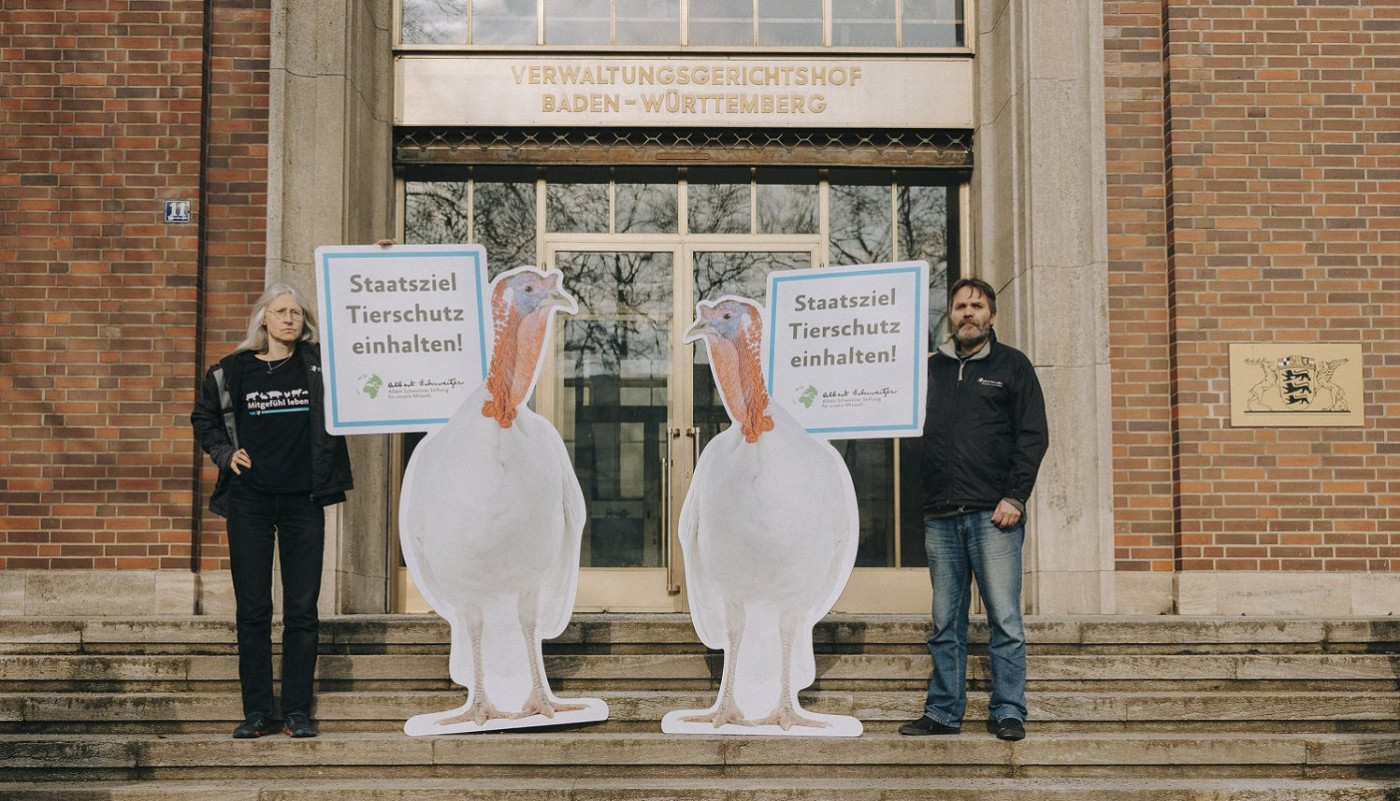
The German Administrative Court in Mannheim has classified the common husbandry practice of turkey farming as contrary to animal welfare in its reasons for judgment (in German) on the so-called turkey lawsuit. The court thus agrees largely with the opinion of Menschen für Tierrechte Baden-Württemberg e. V. (People for Animals Right Baden-Wuerttemberg) and the Albert Schweitzer Foundation, which have taken action on this issue. Although the ruling relates to the specific case of a turkey farm in the Schwäbisch Hall district, it sets a precedent for the entire sector.
Success against the turkey industry
The turkey farm in question keeps the animals in accordance with the voluntary husbandry guidelines of the turkey industry. The veterinary office in charge therefore classified it as an example for »good turkey farming«. People for Animal Rights, supported by the Albert Schweitzer Foundation, took legal action against this, as they find that the animals are kept in a way that causes pain and suffering and is therefore not compatible with the Animal Welfare Act – this assessment was shared by the court.
The reasons for the judgment state: »The [...] husbandry system in use here, where turkeys are kept in flocks of several thousand animals and in sheds that have almost no structuring elements or options for retreat and do not allow the animals to ›perch‹ – especially at night [...], is not compatible with the requirements of Section 2 No. 1 Var. 3 TierSchG [Animal Welfare Act]. With husbandry systems such as this, species-appropriate and needs-based resting and social behavior of the animals is not guaranteed [...], this is accompanied by undue impairment of their basic needs [...].«
The court also made it unmistakably clear that the poultry industry's husbandry guidelines – namely the »Bundeseinheitliche Eckwerte für eine freiwillige Vereinbarung zur Haltung von Mastputen« (»National standard benchmarks for a voluntary agreement on turkey farming«) – are completely unsuitable as a benchmark for species- and needs-based nutrition, care, and housing of the animals. »Neither a comprehensible discussion of the species-specific needs of turkeys nor any substantial justification for the recommendations and assessments made can be found in the agreement«, according to the court's assessment. In the future, the industry will no longer be able to refer to these benchmarks when talking about »Tierwohl« (animal welfare).
Cannibalism, pain, and health problems are facts
In particular, the following problems in conventional turkey farming are indisputable facts for the court:
- Lack of activity and exercise lead to natural foraging and exploratory behavior being misdirected into aggressive, damaging pecking and even cannibalism. This is why the animals' beak tips, which contain a lot of nerves, are trimmed as a prophylactic measure.
- Particularly the keeping of the animals on damp litter leads to painful foot pad lesions (inflammation, ulcers, swelling).
- Wetness, dirt, damp litter and droppings lead to soiling of the plumage. This impairs the protective function of the plumage (consisting especially in keeping the animals warm and protecting them against dirt, humidity, infections and injuries), which negatively affects the well-being of the animals.
- Painful foot pad lesions, the high body weight of the animals, musculoskeletal disorders and high temperatures in summer lead to the animals lying down more often. This results in pressure sores, inflammation, and even skin ulcers on the chest. The dirtier and wetter the litter and the more featherless the breast, the more serious the consequences.
Conclusion: husbandry practices must be changed regardless of economic interests
In its ruling, the court obligated the veterinary office in charge to reassess the situation at the turkey farm in question and to impose improvements to the way the animals are kept. In doing so, the office must take the court’s reasons for the judgment into account. Possible measures listed by the court include a significant reduction in stocking density and flock size, structuring of the shed, enrichment with manipulable material, provision of perching options, and more detailed specifications regarding the type of litter and the relevant renewal intervals. According to the court, it is not decisive whether this affects the profitability of turkey farming. The court thus placed the welfare of the animals above the economic interests of the turkey farmer.
Disappointing: beak trimming for turkeys as such not called into question
With regard to beak trimming, which causes pain and is intended to reduce injuries caused by pecking and cannibalism, the court considers the hatchery to be solely responsible. The hatchery trims the beaks of the turkey poults and has permission to do so. According to the court, the farm cannot be held accountable for this.
The animal welfare organizations do not share this opinion and other assessments of the court regarding further important key issues. With respect to beak trimming, for example, the court fails to recognize that the exception to the amputation ban should only apply if the procedure is actually essential, but not if the husbandry standards could be improved – as was confirmed by the court for the farm in question. In addition, it was overlooked that it is not the hatchery but the turkey farmer who must provide plausible documentation on the indispensability of the amputation so that the hatchery can apply for an exemption from the fundamental ban in the first place.